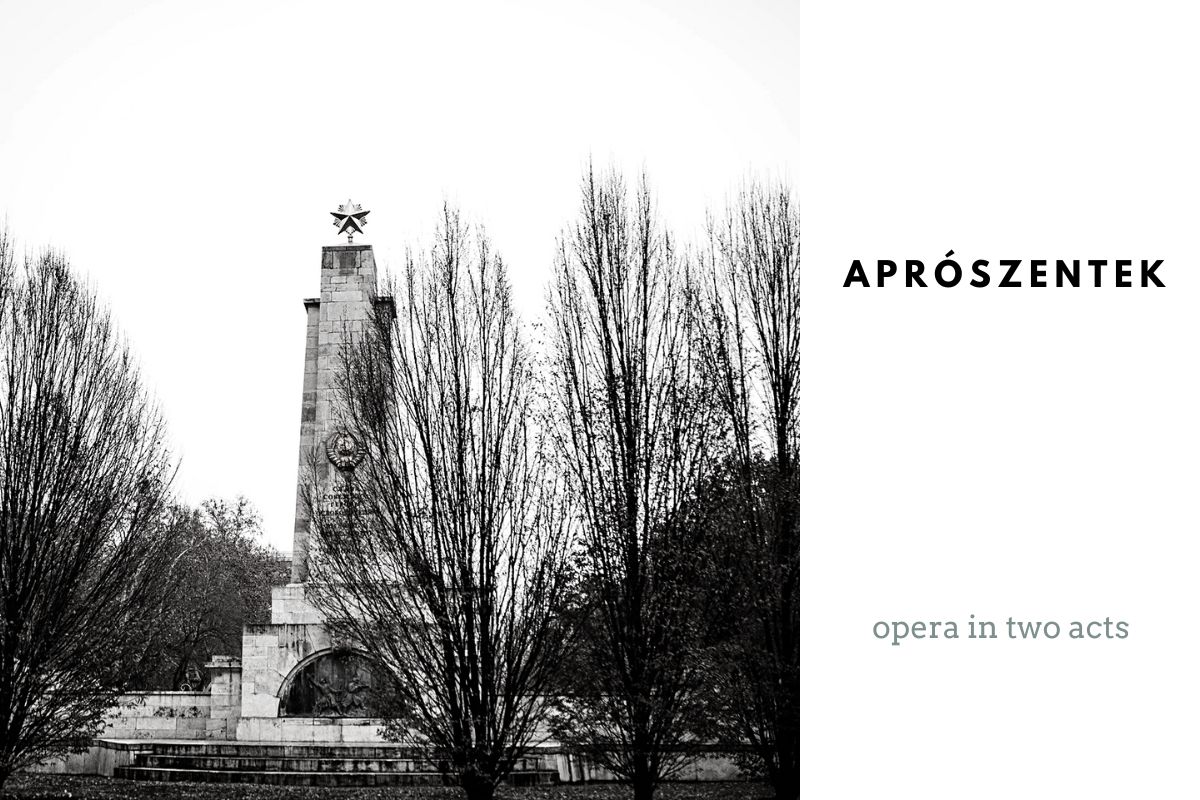Aprószentek

Opera in two acts
Libretto: Zsófia Tallér based on a novel by Szilárd Rubin, and its stage adaptation Where Even the Wolf is Good (Gábor Németh and Péter Gothár) , with the kind permission of the rights holders.
The opera has a duration of approximately 80 minutes.
Cast and Instrumentation
JANCSÓ PIROSKA – coloratura soprano
SZILÁRD RUBIN I. – actor, spoken role
SZILÁRD RUBIN II. / MIKES, firefighter – tenor
MRS. KOVÁCS – alto
TWO WOMEN – 2 mezzo-sopranos
SÁNDOR FARKAS, police lieutenant – baritone
SOVIET SOLDIER – high baritone
GUARD – baritone
BORBÁLA KARÁCSONY, prison guard – soprano
MAJOR BUNDÁS – bass
COLONEL RAGULIN – tenor
MARIKA DOBOS, victim – soprano
MARIKA KALOCSAI, victim – soprano
MRS. SÜTŐ – mezzo-soprano
DOCTOR – spoken role
ILKA CZENE (the Sütő family’s neighbour) – soprano (chorus)
Silent extras: Jancsó Borbála, her father, Józsika, Márton Sütő
Women’s and girls’ choir (approx. 20–24 singers, children and adults)
Chamber Orchestra
1 Flute
1 Oboe
1 Clarinet in Bb / Bass Clarinet in Bb
1 Bassoon
2 Horns
1 Trombone
1 Timpani
1 Percussion (tambourine, snare drum, tam-tam, triangle, cymbals, suspended cymbal)
1 Piano
1 Harp
String quintet (2 Violins, 1 Viola, 1 Cello, 1 Double Bass)
About the Story
The stage adaptation of Aprószentek (Holy Innocents) was first presented in 2013 at Katona József Theatre in Budapest. Szilárd Rubin (1927–2010) was associated with Újhold, a defining Hungarian literary journal of the 20th century, and belonged to the same circle of writers and poets as János Pilinszky, Ágnes Nemes Nagy, and István Örkény. He shared a legendary, deep friendship with Pilinszky. Though a late-recognised talent, Rubin’s work finally began to receive its due recognition only in the final years of his life and posthumously. Péter Esterházy once wrote of Csirkejáték:
“It is rare in Hungarian literature to find such attentive scrutiny of one’s own darkness; a lack of sentimentality, a cold flame of dispassionate interest, something bare or pagan in its gaze—not objective, but direct and unhidden. Rare. There is composure, even in defeat, in shame, or in hysteria: things are as they are. This composure is what makes the book unique; a meteor, a Martian—yet fully present.”
The core narrative of Aprószentek is based on a true crime that occurred between October 1953 and August 1954: the disappearance of five teenage girls in the Hungarian town of Törökszentmiklós. Suspicion fell on 20-year-old Piroska Jancsó, who was ultimately convicted and executed. But in 1950s Hungary, the line between real investigation and political fabrication was dangerously blurred. Piroska initially accused Soviet soldiers of the crimes, later claimed she acted alone, and finally implicated her own mother.
Twelve years later, while searching for literary inspiration, Rubin encountered a photograph of Piroska and became obsessively fascinated by her. He believed the case was the product of a show trial and spent over forty years researching and writing his haunting, fragmented novel Aprószentek, which was published in 2012. Through the fog of mystery, legal proceedings, and his own profound emotional entanglement, Rubin crafted a Dostoevskian vision in which guilt and punishment are viewed through a strikingly different lens. Though rooted in a brutal crime, the opera’s emotional and symbolic structure echoes the world of Hungarian folk ballads and is shaped by mythological motifs. Its tone is infused with the quiet, piercing humanism associated with Pilinszky’s thinking.
Composer’s Note
I first saw Where Even the Wolf is Good in 2013, directed by Péter Gothár at the Katona József Theatre. I was deeply moved. The emotional complexity and sheer gravity of the subject—both the underlying tragedy and Rubin’s personal story—compelled me to create a work for ensemble and voices in operatic form.
Péter Gothár, Gábor Németh and Rubin’s literary heir, Péter Siklós, all gave their full support to the project. I was fortunate to have Gábor Németh’s assistance with the dramaturgy.



